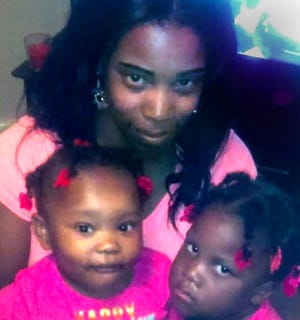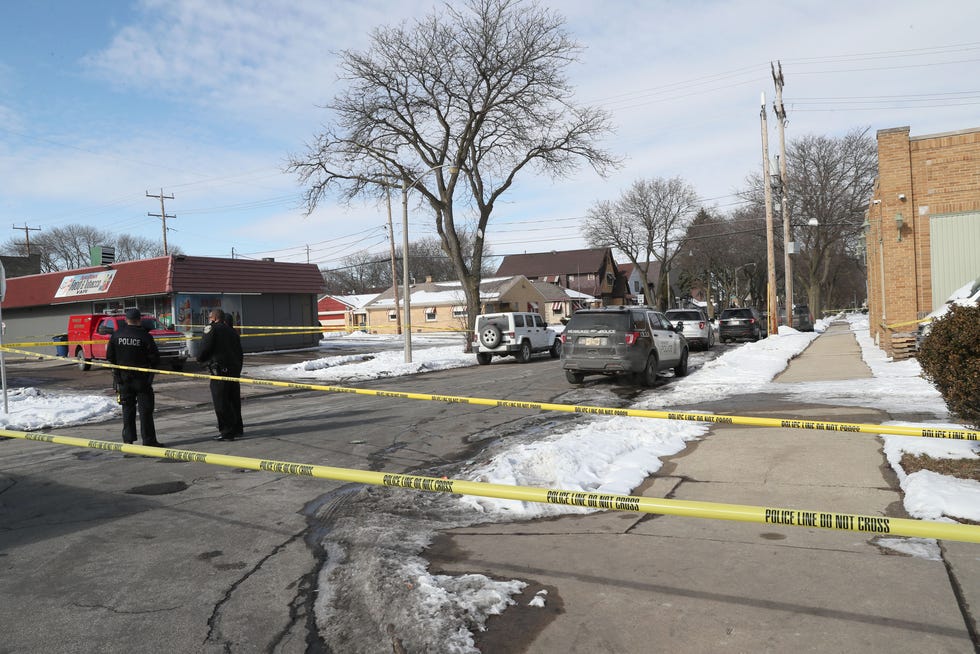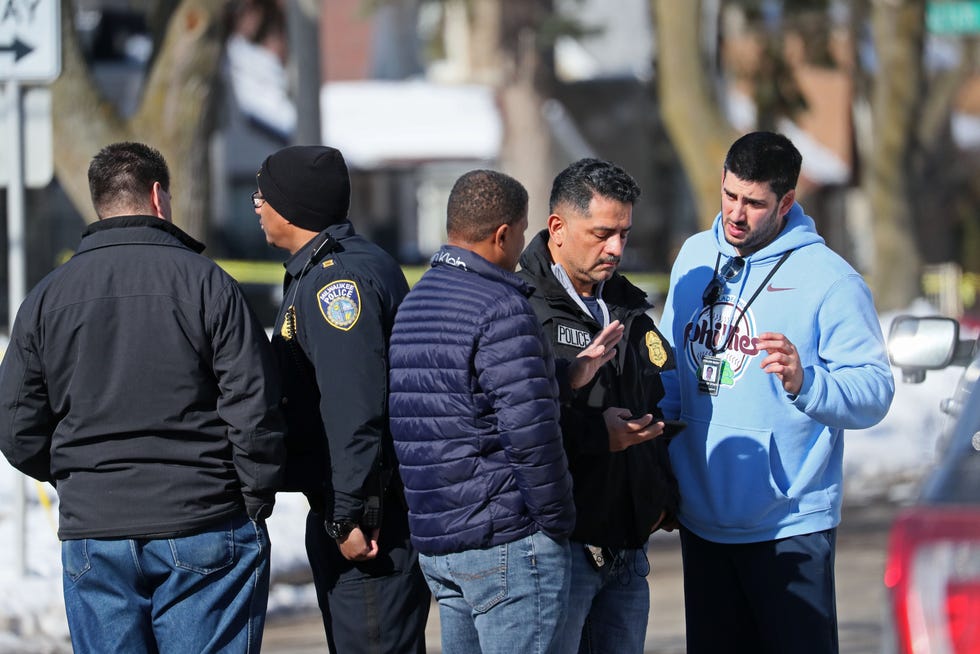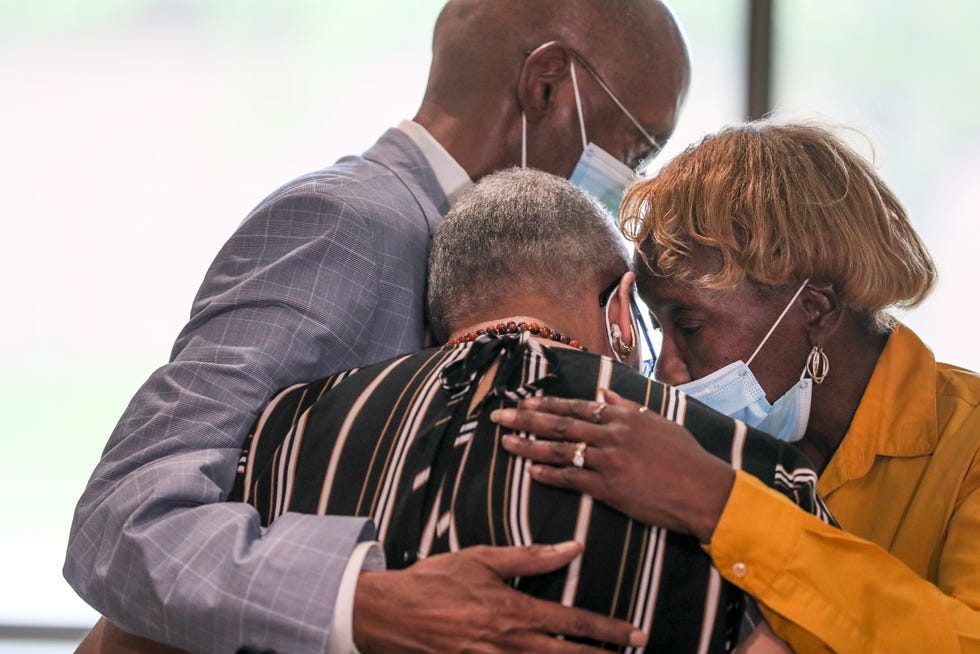A mishandled 911 call, a delayed Amber Alert and a grisly crime: What went wrong in the case of a murdered Milwaukee mom and her daughters

A woman inside a Milwaukee apartment woke up to a loud thump against her wall and her neighbor yelling.
“You can hear her screaming,” the woman told the 911 operator. “He over there jumping on her. You can hear it through the walls about cheatin’ and I just need somebody to come check on her.”
The woman continued: “You can hear her through the wall. He over there beatin’ the hell out of this girl.”
The 911 operator, Christin Saint Pierre, typed into the Milwaukee Police Department’s dispatching system.
She left out key information, an internal investigation later found.
Because of that, officers were slow to arrive and unclear on where the screaming was coming from. They drove through the complex with their windows rolled down and then parked for 10 minutes to watch for any suspicious activity.
They never left their squad car.
A day later, concerned family members contacted police. Their loved ones, 26-year-old Amarah “Jerica” Banks and her two young daughters, Zaniya and Camaria, were missing.
They were found a week later after their killer fled to Memphis, Tennessee, and confessed to his father. Arzel Ivery, the ex-boyfriend of Banks and father of Zaniya, had strangled them at their home before burning their bodies at his apartment garage about four miles away.
Ivery, 27, was sentenced to life in prison this month, with a judge calling his crimes “horrendous.”
Banks’ family had concerns with how police handled the case right from the start when they filed the missing person report.
“I was pretty disgusted,” said David Fields Jr., Banks’ brother. “I don’t think the police followed through at all. I blame some of this on them.”
He believes police could have made it there in time to save Banks or her daughters. He did not know about the internal investigation into the actions of the 911 operator and officers until a Milwaukee Journal Sentinel reporter told him about it.
“I still think they need to be held accountable,” he said.
Homicide detectives looked into earlier child’s death
The murder of Banks and her daughters began with another death.
Arzel Ivery Jr. died Jan. 24, 2020.
He was 21 months old.
The toddler, Banks’ only son, had a history of asthma, which his mother meticulously monitored. Police and medical examiner’s reports described what happened the last day of his life.
On Jan. 23, 2020, she was home with her three children. Ivery had been staying with them after a fire at his apartment.
Banks noticed her son displaying some symptoms. She had plans with her sister that night. As she left, she told Ivery to watch their son closely to see if his condition worsened.
Banks stayed overnight at her sister’s and went right to work the next morning.
Back at the apartment, Ivery got the children ready for school. When he tried to drop off his son for day care, a staff member stopped him and said the toddler was too sick to attend. The girls went to school as usual.
Ivery called off work and spent the day with his son, later telling detectives the child had some trouble breathing, but “it was not anything unusual,” according to a police report.
Around 3 p.m., Ivery put his son, who was making slow gasping sounds, in the car and drove to pick up the girls. By the time he arrived, the boy was slumped against the door.
At the day care, an employee told Ivery to take the child to a hospital. Instead, Ivery drove around for an hour and stopped to buy snacks before finally heading to Columbia St. Mary’s Hospital.
By then, the toddler had stopped breathing. A nurse could not find a pulse.
Medical staff notified Milwaukee police of the boy’s sudden death and homicide detectives interviewed Ivery and Banks, who had left work after Ivery called to tell her he was at the hospital.
Detectives asked Banks about any violence at home or if her son had been injured recently.
No, she replied.
There had been violence before, she told the detectives, but that was years ago.
In 2018, Ivery was arrested in a domestic violence case involving Banks.
Prosecutors did not file charges against him.
A neighbor sees a desperate run while another calls 911 for help
Arzel Jr.’s funeral was Feb. 7, 2020.
After the service and a family gathering, a relative drove Banks and her daughters home after midnight.
The relative saw Banks and the girls entering their apartment building before driving away.
Ivery had been working that night and returned around 1:30 a.m. when he and Banks got into an argument. Banks blamed him for their son’s death.
Shortly before 2 a.m., a neighbor woke to the sound of three or four thumping sounds from the wall she shared with Banks.
The neighbor went closer to the wall to listen and heard a woman scream: “No, no, I didn’t even do anything.”
Then she heard a man yelling and accusing the woman of cheating. She called 911 and walked into the living room where another woman was sitting.
The man next door was “beatin’ the hell out of this girl,” she said, while on the phone with 911.
The other woman in the living room heard a noise and looked out the window. She saw Banks running through the parking lot without shoes and wearing a white memorial T-shirt for her son. Banks was bleeding from her mouth, the woman later told detectives.
The woman watched as a man grabbed Banks and dragged her back to the apartment.
Both the woman on the phone with 911 and the one watching from the window later told police they heard Banks screaming the same thing.
“Don’t kill me.”
Call coded as lower priority, no mention of a beating
The 911 call came in at 1:51 a.m. Feb. 8.
The operator, Saint Pierre, classified it as a Priority 2 call that did not require an immediate response — a decision multiple department officials later said was wrong in an internal investigation into the police response.
She described it as a general “call for police,” not a battery that was in progress.
She did not pass on that the caller shared a wall with the neighbor.
Instead, she wrote the sound came from a building to the south of the caller, even though the caller said it came from the north. Saint Pierre later said she made that decision after questioning the caller about nearby streets to determine a more precise location.
The computer dispatching system included the neighbor’s address of 5908 N. Sherman Blvd. and a description that the 911 caller woke up to sounds of her female neighbor screaming that a man was jumping on her.
At the nearest district station, officers Shahriar Solati and Nicholas Kuchta had just returned from investigating a domestic violence call and were writing up their reports. Other officers had just been sent to a shooting and they were one of the few squads available.
A dispatcher’s voice came over their radio at 1:53 a.m. and broadcast the pending call for police service. Their supervisor, a sergeant, asked what they were doing.
Solati replied they were filing a domestic violence report and arrest warrant. The sergeant told them to finish the warrant and then respond to incoming calls.
Solati and Kuchta were dispatched at 2 a.m. and before leaving the station, they checked with the sergeant to make sure the warrant was entered properly.
Then they went to pick up their body-worn cameras, which had been downloading footage from the prior call. The download was almost done, the acting desk sergeant said. Could they wait a few more minutes?
The officers finally left at 2:15 a.m. — 24 minutes after the neighbor called 911.
The information in their squad computer initially noted the 911 caller could be reached by phone or in person, but then they saw an update.
Saint Pierre had asked the female caller if she wanted to remain anonymous. She did.
A minute after reading the caller could be contacted, the officers noticed the entry had been changed to “Anonymous.”
A missing person report filed, then days later an Amber Alert
Officers got to the apartment complex in five minutes.
They looked for an apartment building to the south of 5908 N. Sherman Blvd., the location listed in their squad computer.
There was none.
They waited for several minutes in front of the 5908 building with their windows down. They did not see any lights on, nor did they hear anything.
The officers told internal investigators they did not call back the 911 caller since that person wanted to remain anonymous, even though the Police Department also has a “do not call” classification that means no contact. “Anonymous” means the caller does not wish to be identified in any reports, officials later said.
The officers slowly drove around the complex and parked near the north entrance. They waited for 10 minutes. No other updates had come into their computer. They didn’t ask the dispatcher for more information.
They left at 2:35 a.m.
It’s unknown exactly what time Ivery killed Banks and her daughters, 5-year-old Zaniya and 4-year-old Camaria.
But Ivery did confess to strangling Banks during their fight the night of their son’s funeral — the altercation the neighbor reported at 1:51 a.m.
Ivery told detectives he did not want the girls to live in a world without their mother.
So after killing her, he strangled them, too.
The next day, Banks’ family filed a missing person report.
Four days later, the Milwaukee Police Department notified local media about the case.

Another two days passed before the department issued an Amber Alert after receiving information from police in Memphis, where Ivery had gone to his father’s house.
By that time, Milwaukee police already had spoken to Ivery by phone during the missing person case. He said he and Banks had fought after the funeral and told investigators he would meet with them when he was back in Milwaukee in a week.
Within a day, the Amber Alert was canceled; Ivery had told police where they could find the bodies of Banks and her daughters.
After killing all three, Ivery had wrapped them in an air mattress and took their bodies to his old apartment building on Burleigh Street. He hid them in the back corner of a garage, doused them with gasoline and set a fire.
When detectives searched the garage, they found remains with bits of white T-shirt still visible — the funeral shirts memorializing Arzel Jr.

Two officers fired, then suspended instead
After the horrific discovery, the family and community members demanded answers from the Milwaukee police, an agency that has been criticized for its response to missing women and girls of color.
Then-Police Chief Alfonso Morales defended his department, which had issued a statement saying investigators worked “relentlessly” to find the family.
“As you see, people will blame the Police Department regarding these deaths. That’s unfair, uncalled for and unwarranted,” Morales said at a news conference where he decried domestic violence as a “systemic problem that’s been going on for generations.”
At that time, department officials said they were reviewing a 911 call that “may be related to this incident.”

The next month, Milwaukee had its first case of COVID-19. Then came the police killing of George Floyd in Minneapolis and ensuing protests and civil unrest, followed by Morales’ ouster. The case of Banks and her daughters faded from the news.
The department launched an internal investigation and found the 911 operator and officers had made errors and mistakes, although all three defended their actions as consistent with department policies and training in a later disciplinary hearing.
Saint Pierre, the 911 operator, resigned before the internal probe was complete and took a job as a prosecutor in the Milwaukee County District Attorney’s Office. She resigned from that position in June.
Micheal Brunson, by then the acting police chief, fired the two officers, Solati and Kuchta, for failing to conduct a thorough and complete investigation.
The officers appealed to the Fire and Police Commission and got their jobs back in January.
The panel of commissioners — Everett Cocroft, Fred Crouther and Steven DeVougas — issued suspensions instead, 30 days for Solati, the more experienced officer, and 15 days for Kuchta, who had been on the job for two years.
In their written decision, commissioners noted the officers had no prior discipline and pointed out the department had not provided other examples of officers who had been fired for committing the same infraction.
The commissioners laid as much blame on Saint Pierre, the 911 operator.
911 operator: The ‘most important actor’ in the case
The 911 call-taker has defended her actions.
The officers’ attorney called her as a witness during their disciplinary appeal and later told the Journal Sentinel she was the “most important actor” because how she handled the call dictated how the officers responded to it.
Saint Pierre said she designated it a Priority 2 because the woman had only heard sounds and did not see an assault. She cited a department manual saying that classification is appropriate when a call is from a third party who does not know what exactly is happening.
The officers’ attorney, Brendan Matthews, asked if she could have made it a Priority 1 call. Such calls are life-threatening incidents involving a criminal act or an emergency that threatens life.
“I would have been written up if I would have done that,” she replied.
She said she had been reprimanded before for giving a Priority 1 to a similar call.
Matthews read a portion of the internal investigation that quoted a 911 trainer, who said the call “should not have been classified as anything other than a battery.”
Matthews emphasized the trainer specifically said: “This one was clear as day.”
The Journal Sentinel’s efforts to reach Saint Pierre were not successful.
The officers served their suspensions. Solati is back on active duty. The department did not make him available for an interview. Kuchta resigned from the department and did not return a reporter’s phone call.
Matthews, who stressed he cannot speak for Kuchta, told the Journal Sentinel he believed the officer left for a more stable job.
“The entire ordeal really took its toll on him, which is unfortunate because by all accounts, he was an excellent and dedicated officer,” Matthews said in an email.
Officer: ‘Could things have been handled differently? My answer is yes’
The officers and their attorney acknowledged they could have done more.
“As I said during the hearing, did these officers do a great job on the call at issue? No. But they did what was required of them,” Matthews told the Journal Sentinel.
“In this case, these officers will never know what they might have been able to accomplish if they’d been given accurate information — or even the appropriate information,” he added.
The officers raised similar points during their appeal hearing.
“Considering and looking back at the day in question, could things have been handled differently? My answer is yes,” Solati said, addressing the commissioners.
“Could the outcome of the morning been altered by a change in our actions? My answer is I don’t know.
“What I do know is that there was no malicious intent, laziness or lack of care on our part,” he said. “I am truly sorry for the pain the surviving family has had to endure.”
His partner, Kuchta, said he continued to think about the call months later.
“I’ve played the what-if game inside my head many times since this incident, wondering if I could have done anything that could have changed the outcome of what happened,” Kuchta told the panel.
What if he tried the 911 caller anyway? What if he had gotten out of the squad car and walked around the building?
“This is something I must live with,” Kuchta said.
It’s something Banks’ family must live with, too.
“For me, half of everything is gone,” said Bank’s mother, Valeria Spinner-Banks. “Half of everything has just been wiped away.”

She and her husband, Acklen Banks, want to remember everything about their daughter and grandchildren:
Banks growing into motherhood. Zaniya smiling as she hula-hooped. Camaria surprising everyone with her whistling skills. Arzel Jr. giggling when people called him “Baby Zel.”
They want to remember everything except the horrific way they died.
How this story was reported
This article is based on numerous public records, including police reports, medical examiner’s records, court files and records from the Fire and Police Commission. Those records also included video of the officers’ disciplinary appeal hearing.
The reporter attended the sentencing of Arzel Ivery Sr. and the Banks family news conference after the hearing. This article also referenced earlier coverage of news conferences from the Milwaukee Police Department related to the discovery of Banks and her daughters.
Where to find help
The Sojourner Family Peace Center in Milwaukee operates a 24-hour confidential hotline at (414) 933-2722 and offers assistance with e-filing for restraining orders at (414) 278-5079.
The Milwaukee Women’s Center also offers a hotline at (414) 671-6140.
The Asha Project, which serves African American women in Milwaukee, provides a crisis line from 9 a.m. to 4 p.m. at (414) 252-0075.
Diverse & Resilient, which serves the LGBTQ community, operates the “Room to Be Safe” resource line (414) 856-5428 and has online resources at roomtobesafe.org.
The Hmong American Women’s Association, which serves the Hmong and southeast Asian community, has advocates available at (414) 930-9352 from 8 a.m. to 4:30 p.m. Monday through Friday. The WI Hmong Family Strengthening Helpline is available after hours at (877) 740-4292.
The UMOS Latina Resource Center in Milwaukee offers bilingual, bicultural, domestic violence, sexual assault and anti-human trafficking supportive services and operates a 24-hour hotline at (414) 389-6510.
Contact Ashley Luthern at ashley.luthern@jrn.com. Follow her on Twitter at @aluthern.

